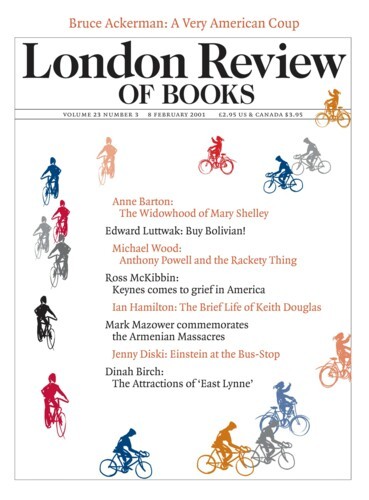If the balaclava’d guerrilleros of the Animal Liberation Front run short of targets once they’ve seen off the laboratories full of victimised mice, they might consider picketing the rare but potentially newsworthy venues in which academic psychologists on the professional ascent try to make up their minds whether animals, too, have minds that can be made up. Whether, in short, they have cognitive skills, enabling them to think and to swap concepts with one another or, better still, with their academic proprietors. For a long time it seemed to be only the chimpanzees who endured this privileged form of captivity, and who, according to whether you were hearing it from a believer or a sceptic, in some cases did and in other cases didn’t prove eventually able to communicate with their warders.
Just the other day, however, a serious enough book appeared called The Alex Studies (Harvard, £27.50), which breaks fresh zoological ground by having to do with ‘the cognitive and communicative abilities of grey parrots’. Some of us won’t have realised that there exist such inherently disappointing birds as grey parrots, but if they turn out to be good at cognition and communication that would surely make up for the shortcomings in their plumage. The book’s author, Irene Maxine Pepperberg, has to date spent some twenty years closeted with parrots and in particular with Alex, and has a two and a half page list of publications in her bibliography to show that the time has been productively spent. It seems that parrots have larger brains than quite a lot of birds, than pigeons to take the obvious example, bywords for stupidity who were famously recruited years ago by B.F. Skinner to man his laboratory boxes and prove by their inane and obedient pecking that the behaviourist view of things didn’t have any need of self-consciousness to explain how it is we learn to do what we do. So are parrots in a different case? Have we underestimated them in supposing that, far from having cognitive abilities of their own, they were to be admired for nothing more than mindlessly reproducing bits and pieces of their linguistic environment? Some experts think Pepperberg has been getting somewhere with the loquacious Alex, others don’t. Myself, I’m reminded of an exchange from the decidedly engaging 1950s gangster version of Macbeth, Joe Macbeth, when to Banquo’s line about the ‘temple-haunting martlet’ being of good omen the ruthless answer given is ‘boids dunno from nuttin’.’
Come the first week in June, the couched cricket-lover will be able to look away from the TV set during those awful end-of-over commercial spots and catch a paragraph or two of Darren Gough’s autobiography, to be called Dazzler, after the not altogether convincing nickname by which the nation knows and loves him. This, we’re assured, is ‘a gripping account of the life in the fast lane of one of our most cherished and successful sportsmen’. Fast lane has to be right, in these days when speedometers are such a prominent part of televised Test cricket, and we wait with almost bated breath for the first bowler to achieve the coveted ton, or the ball delivered at 100 mph – which is not to say that it’s going at anything like that after it’s hit the ground and got down the other end. The Dazzler is not very likely to be the hero who breaks the speed record, given that he’s just turned 30 and gets injured rather a lot: a decent 90 mph is about his limit. What he may be, on the other hand, is the author who wins the William Hill Sports Book of the Year prize for 2001. Were he to do so, it would re-raise an intriguing question raised in the case of the 2000 prize. This went to Lance Armstrong, the American cyclist who has now twice won the Tour de France since getting over a nearly fatal cancer. Needless to say, Armstrong didn’t write his book himself, though he seems to be the first winner of the William Hill prize not to have done so. Gough could be the second. Here then we have a literary award that may go not to the author of the winning book, but its subject. The subject, let’s hope, will go at least halves with his ghost-writer over the £10,000 the prize is worth, but the ghost might well feel that if it’s meant to reward the writing of a book, rather than pedalling furiously through France for three punishing weeks after recovering from cancer, or skittling batsmen round the Test grounds, he should get the lot, and the credit.
Send Letters To:
The Editor
London Review of Books,
28 Little Russell Street
London, WC1A 2HN
letters@lrb.co.uk
Please include name, address, and a telephone number.

